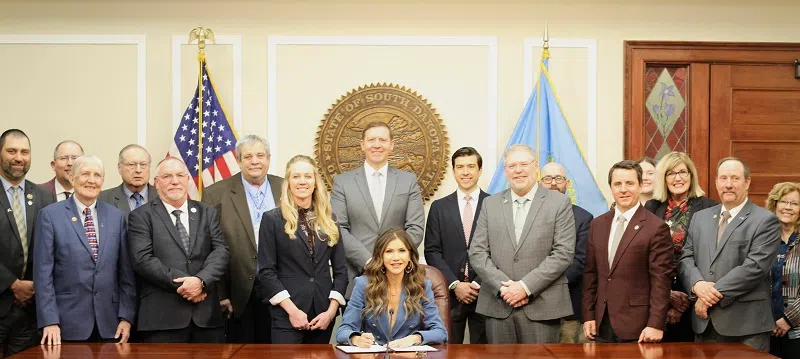MARCH 4, 2024:
Governor Kristi Noem signed HB 1231, which places restrictions on the ownership of agricultural land, stopping six evil foreign governments and foreign entities from those governments from buying up South Dakota’s precious ag land, into law.
The bill strengthens South Dakota’s protections against foreign ownership of ag land in the following ways:
- Blocks six evil foreign governments (China, Cuba, Iran, North Korea, Russia, and Venezuela) and foreign entities from those governments, from owning South Dakota ag land;
- Strengthens enforcement by putting teeth into the law and requiring more reporting; and
- Closes loopholes in the current foreign ownership of ag land statutes, including the previous lack of limitations for domestic companies, corporations, LLC’s, trusts, and other similar entities that are owned by foreign entities or persons.
This bill will stop nations that are unfriendly to the United States of America from buying up U.S. agricultural land. Foreign adversaries will do all they can to control America – and once they control the food supply, they will control the country. China’s ownership of American ag land has increased by 5,300% in just the past decade.
FEBRUARY 14, 2024:
Governments or nationals from six “bad actor” countries would be prohibited from owning agricultural land in South Dakota under a measure passed by the House Tuesday (Feb. 13, 2024).
HB1231 passed 61 to 6 and would ban ownership by the governments or nationals of Iran, Russia, North Korea, Cuba, Venezuela and China.
Secretary of the state Department of Agriculture and Natural Resources Hunter Roberts says a lot of discussion went into what is proposed in HB1231.
Republican House Majority Leader Will Mortenson from Fort Pierre said the bill was “good policy.” He said the bill was carefully drawn up to restrict foreign ownership of ag land, particularly closing up the definition of “entity” loophole.
Roberts says those from non-hostile countries are still able to purchase ag land in South Dakota.
Roberts says this concern isn’t unique to South Dakota.
Additionally, Roberts says there’s an agriculture land purchase reporting requirement with the U.S. Department of Agriculture, but it’s not necessarily complied with in a timely manner.
HB1231 now goes to the Senate side to continue its path through South Dakota’s legislative process.
DECEMBER 30, 2023:
Foreign ownership of U.S. forest and farmland grew last year, according to a recent US Department of Agriculture report.
Foreign entities bought nearly 3.5 million acres, bringing the total to over 43 million acres. But, USDA says China’s forest and farmland holdings fell to 350-thousand acres, which is less than 1% of foreign-owned acres.
Washington State Republican Dan Newhouse thinks that’s still too much.
“This is about our country’s national security, in ensuring that adversaries like China, like Russia, like North Korea or Iran do not gain a foothold on American soil.”
Newhouse is especially concerned about purchases near sensitive U.S. military sites, as China is accused of doing in North Dakota. That’s a threat Pentagon Assistant Secretary Ely Ratner said the administration takes seriously.
“It supports efforts to prevent adversarial ownership of sensitive land, industry, and sectors, and biotechnology is one worth taking a careful look at.”
Newhouse introduced legislation to broaden the U.S. Treasury Department’s control over foreign ownership of U.S. farm and forest land.
“The People’s Republic of China is only interested in reaping every possible benefit from U.S. land without giving back or considering our future to sustain an independent energy and food production. The U.S. cannot become dependent on our adversaries for our domestic food supply.”
The proposed Senate legislation also requires USDA to have a permanent seat on the Treasury’s Committee on Foreign Investment in the U.S., which sponsors may try to include in the new farm bill.
USDA officials say they plan to update how they collect data to study the impact of foreign land holdings on rural communities and the exact location of foreign-owned acres across the country.








Comments